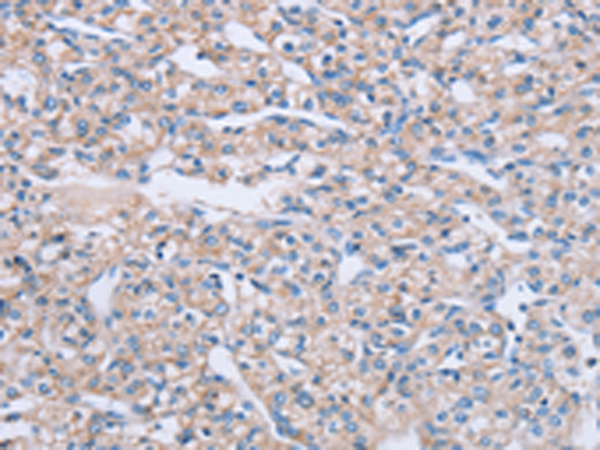

| WB | 咨询技术 | Human,Mouse,Rat |
| IF | 咨询技术 | Human,Mouse,Rat |
| IHC | 1/25-1/100 | Human,Mouse,Rat |
| ICC | 技术咨询 | Human,Mouse,Rat |
| FCM | 咨询技术 | Human,Mouse,Rat |
| Elisa | 1/1000-1/2000 | Human,Mouse,Rat |
| Aliases | TFQTL1; PRO1557; PRO2086 |
| WB Predicted band size | 77 kDa |
| Host/Isotype | Rabbit IgG |
| Antibody Type | Primary antibody |
| Storage | Store at 4°C short term. Aliquot and store at -20°C long term. Avoid freeze/thaw cycles. |
| Species Reactivity | Human |
| Immunogen | Synthetic peptide of human TF |
| Formulation | Purified antibody in PBS with 0.05% sodium azide and 50% glycerol. |
+ +
以下是3篇关于TF(组织因子)抗体的代表性文献概览:
---
1. **文献名称**:*"Role of tissue factor in tumor progression and coagulation"*
**作者**:H. H. Versteeg 等
**摘要**:探讨TF在肿瘤生长和转移中的作用,指出抗TF抗体可通过阻断TF-凝血因子VIIa复合物抑制肿瘤相关凝血及信号通路,从而减缓癌症进展。
2. **文献名称**:*"Tissue factor deficiency attenuates inflammation and thrombosis in murine models"*
**作者**:R. Pawlinski 等
**摘要**:通过动物模型研究,发现抗TF抗体可减少炎症反应和病理性血栓形成,提示TF抗体在治疗炎症相关疾病(如脓毒症)中的潜在价值。
3. **文献名称**:*"Antibody blockade of tissue factor reduces thrombosis in murine models"*
**作者**:B. C. Furie 等
**摘要**:验证抗TF抗体在血栓模型中的疗效,表明其通过抑制TF介导的凝血级联反应显著降低血栓风险,为抗凝治疗提供新策略。
---
如需更多文献或具体研究领域(如自身免疫病),可进一步补充说明!
**Background of TF Antibodies**
Tissue Factor (TF), also known as coagulation factor III or CD142. is a transmembrane glycoprotein encoded by the *F3* gene. It serves as the primary initiator of the extrinsic coagulation cascade by binding to Factor VII/VIIa, triggering thrombin generation and fibrin formation. Beyond its role in hemostasis and thrombosis, TF is implicated in pathological conditions, including cancer progression, inflammation, and autoimmune diseases. In cancer, aberrant TF expression promotes tumor growth, angiogenesis, and metastasis by activating intracellular signaling pathways and releasing procoagulant microparticles.
TF antibodies are immunological tools designed to target and modulate TF activity. In research, they are used to study TF's biological functions, such as its interplay with cellular receptors or its role in disease mechanisms. Therapeutically, monoclonal anti-TF antibodies (e.g., hI-con1. altutomab) have been explored to inhibit TF-driven pathways in cancers or to mitigate thrombotic risks in sepsis and COVID-19. Additionally, TF antibodies aid in diagnostic applications, such as detecting TF overexpression in tumors via immunohistochemistry.
Challenges in TF antibody development include balancing anticoagulant effects without inducing bleeding risks and ensuring specificity to avoid off-target interactions. Ongoing research aims to refine antibody design for improved therapeutic efficacy, highlighting TF's dual role as a critical hemostatic protein and a multifunctional player in disease.
×